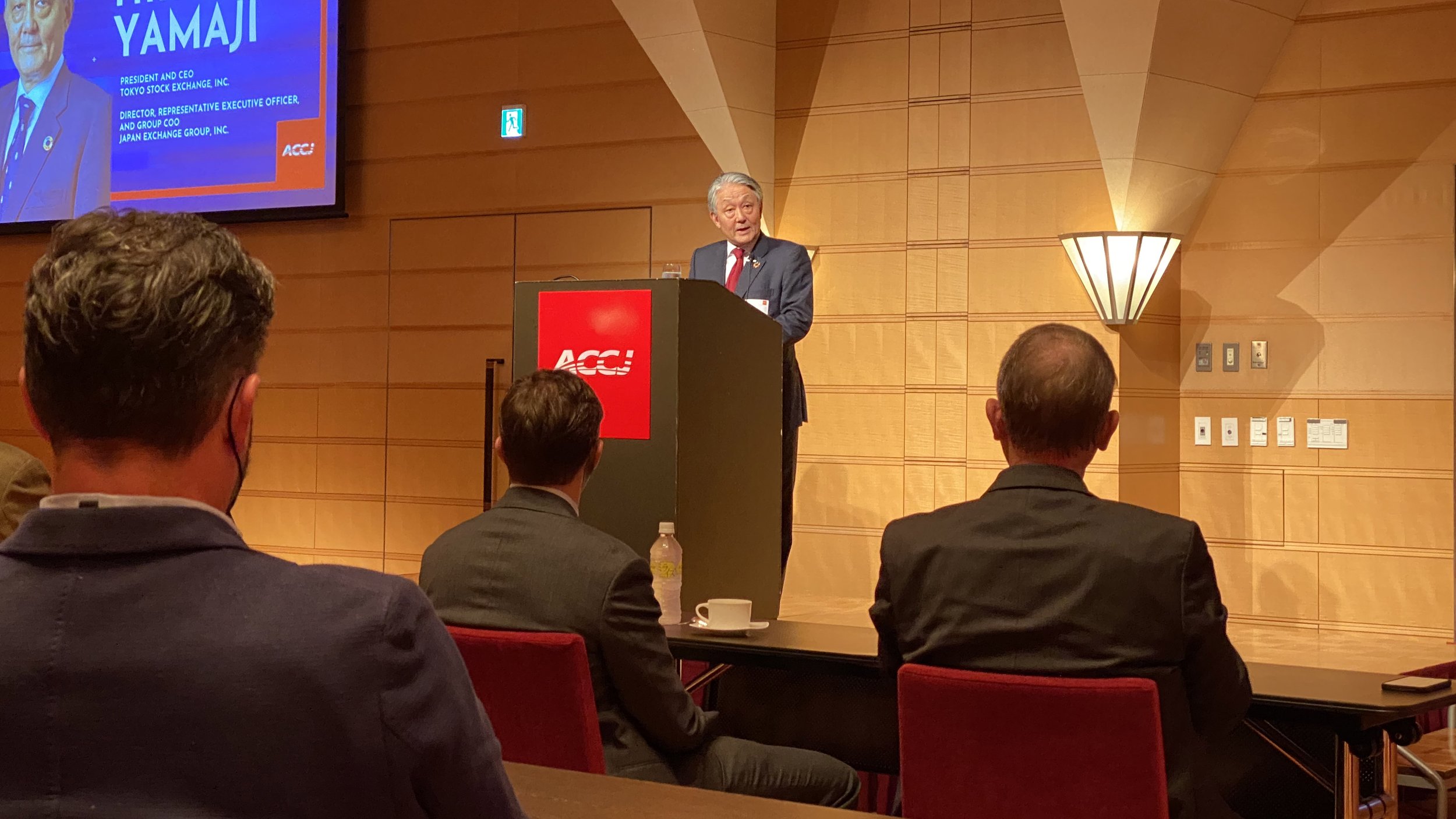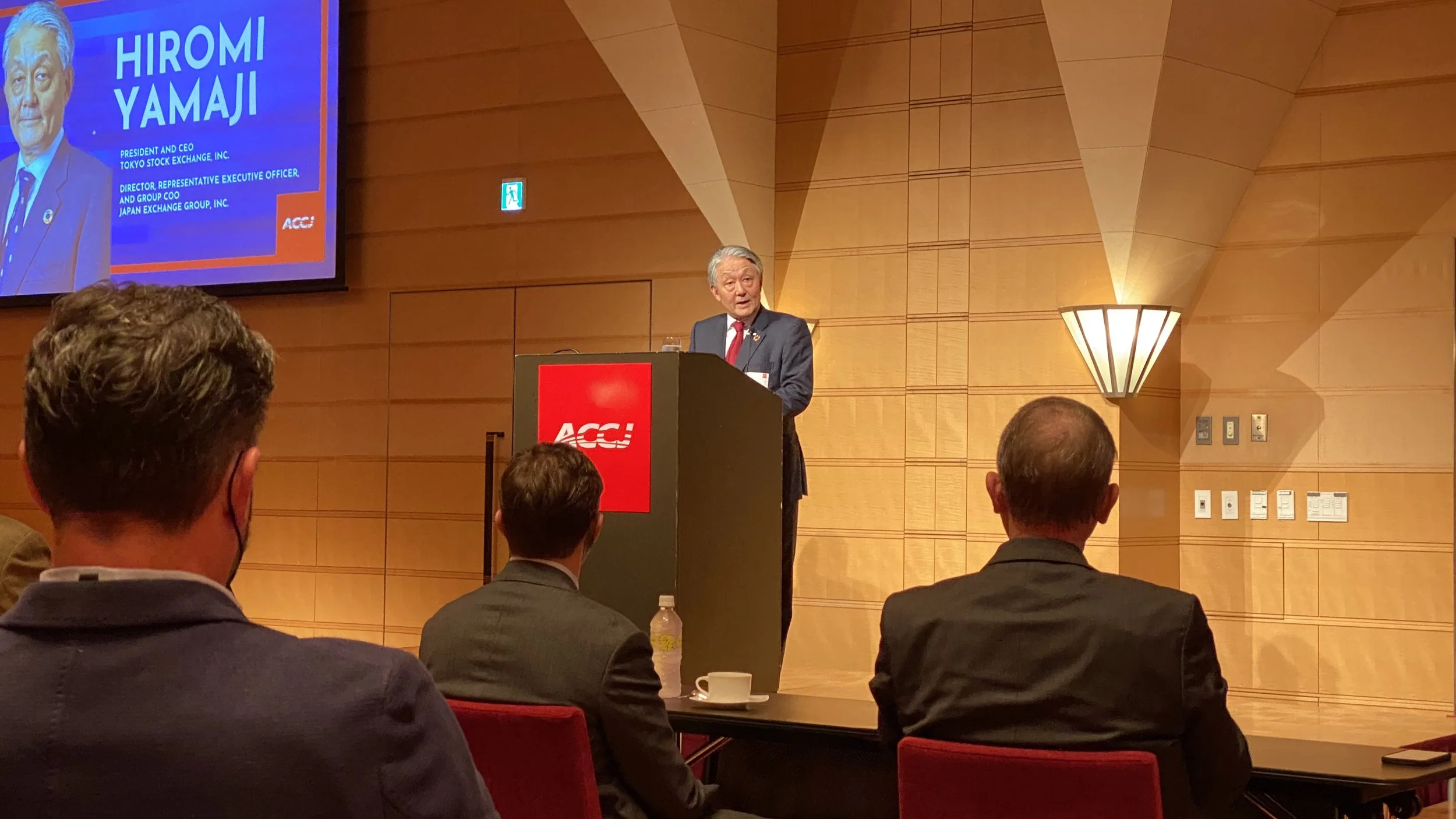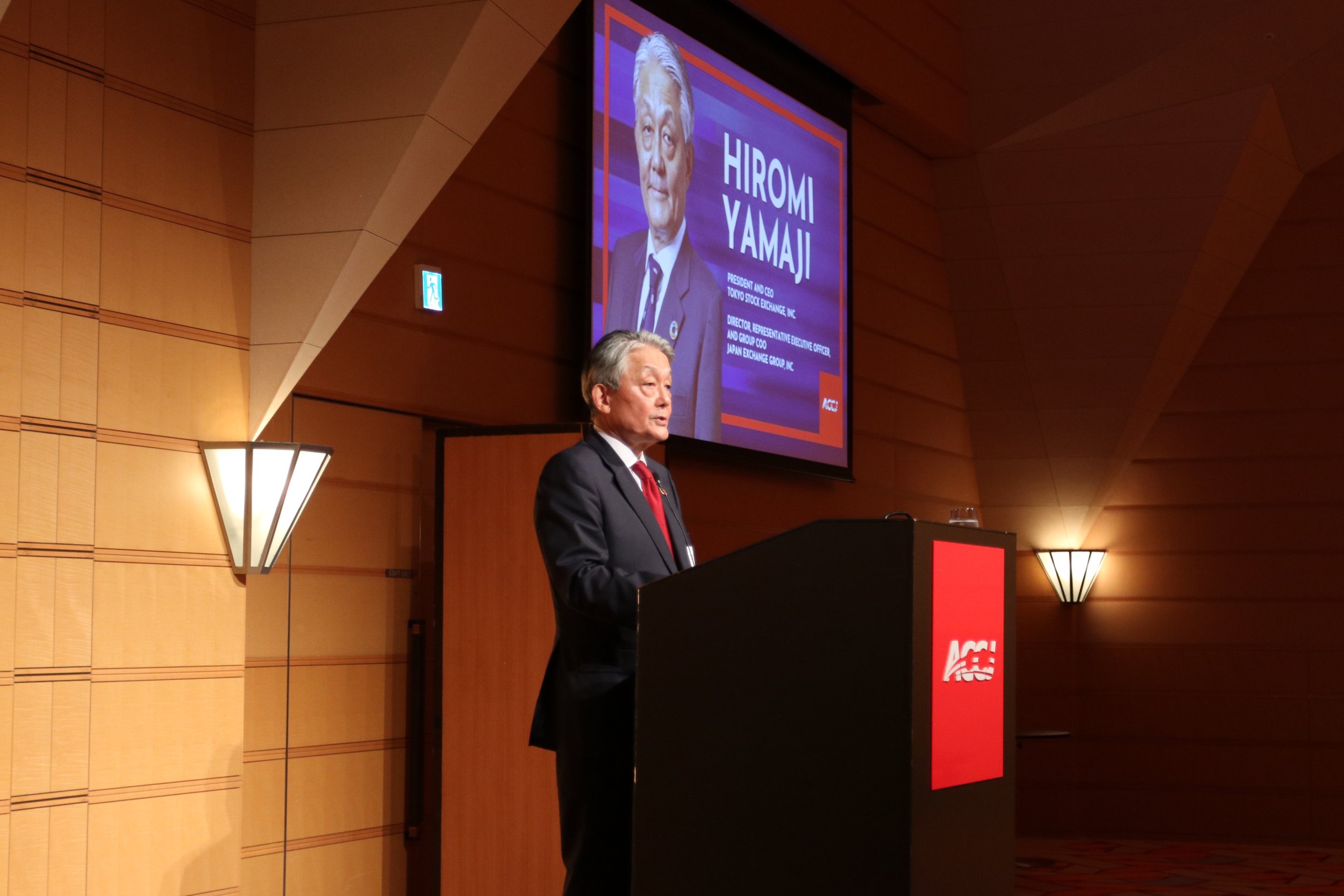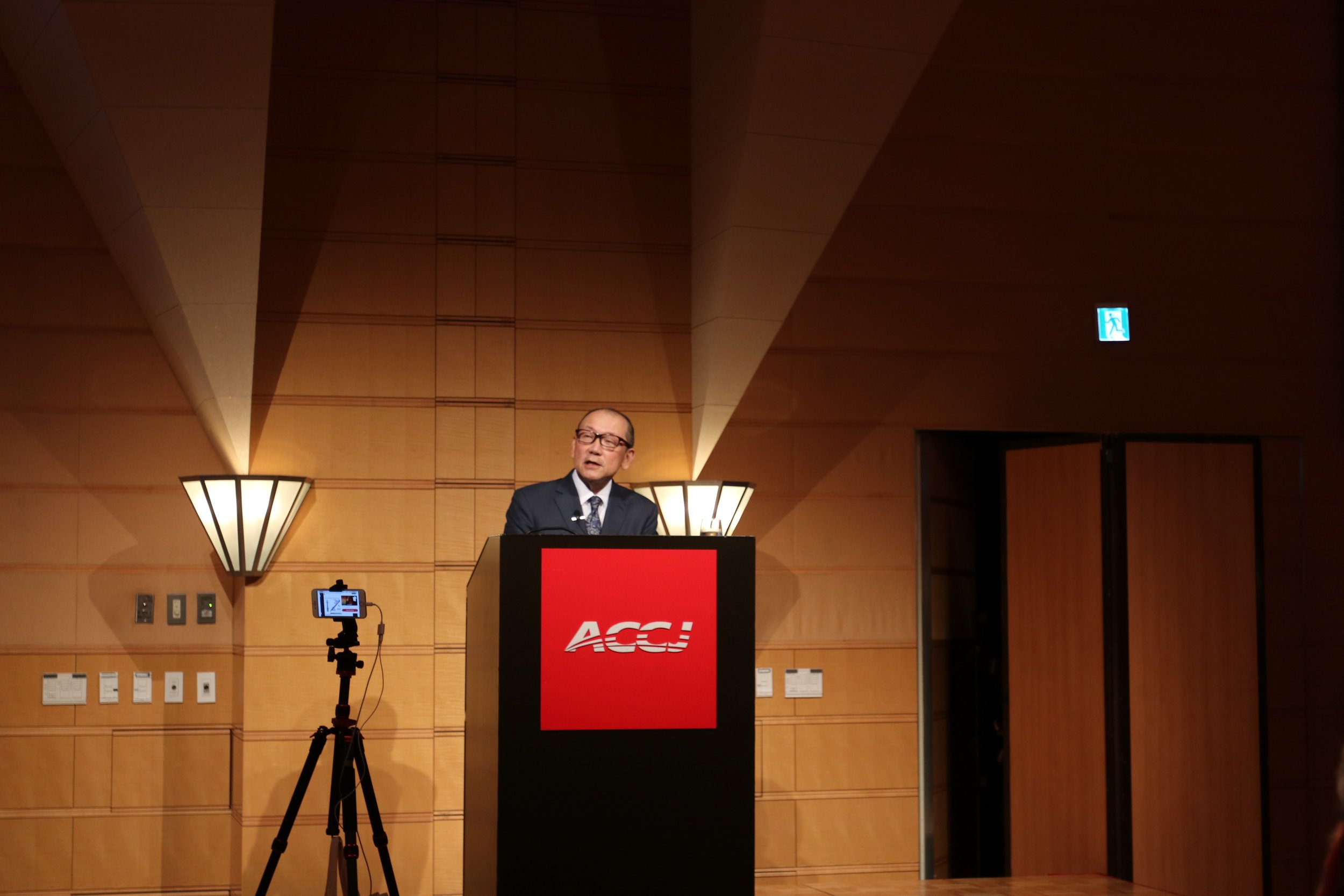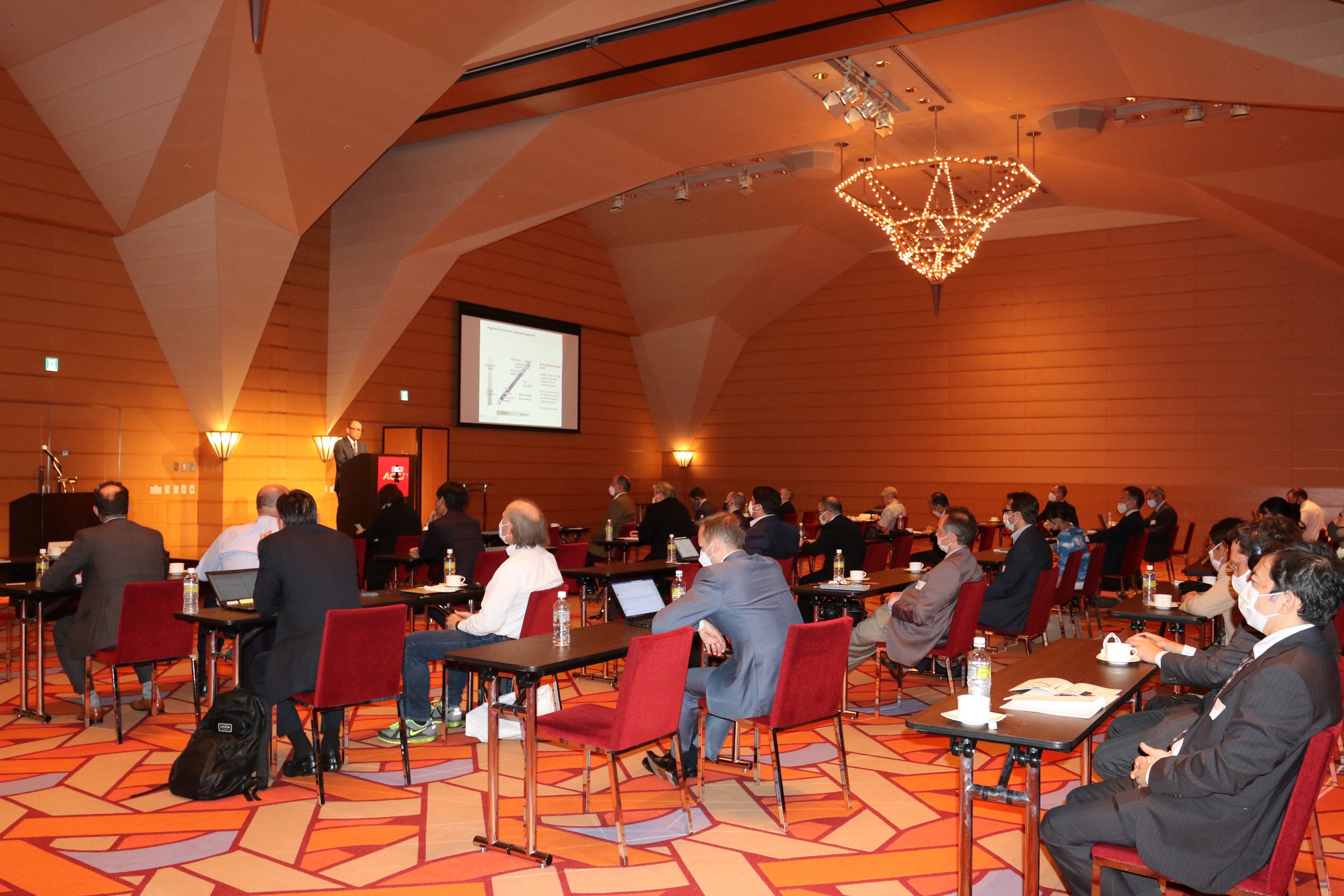Activist Investing in 2022
The Fourth Annual ACCJ Shareholder Forum brought together experts for a look at the state of activist investing in Japan and the realities of the Japanese market.
Fourth Annual ACCJ Shareholder Forum brings together experts from Japan and overseas for a look at the state of the market
Tokyo Stock Exchange President and CEO Hiromi Yamaji delivers the keynote.
Why should anyone care about activist investing in Japan?
This is the question posed by American Chamber of Commerce in Japan (ACCJ) Alternative Investment Committee Chair Frank Packard as he opened the Fourth Annual ACCJ Shareholder Forum on June 7 at Tokyo American Club. The event, which was also livestreamed to remote attendees, has become an important part of the annual general meeting (AGM) season.
Four speakers explored this through a wide-ranging look at the realities of the Japanese market, corporate governance, activist investing, stewardship, shareholder proposals, and more after the keynote was delivered by Hiromi Yamaji, president and chief executive officer of Tokyo Stock Exchange, Inc. (TSE) as well as director, representative officer, and group chief operating officer of Japan Exchange Group, Inc.
Presenting were:
- Nicholas Smith, strategist with CLSA
- Andrew McDermott, president of Mission Value Partners
- Tsuyoshi Maruki, president and CEO of Strategic Capital
- Seth Fischer, founder and chief investment officer at Oasis Management
Packard himself offered some thoughts during the introduction.
“The past 30 years in Japanese public equities provide an interesting lens for today,” he explained. “I want to make the case that we should pay attention because active engagement in Japan might actually be the best global investment strategy today.”
This was not always the case. After the bubble economy of the 1980s burst, activist investing in Japan during the 1990s was somewhat primitive, Packard said. “Some notorious examples, often American, featured activists making simple demands for immediate action to get quick financial return for themselves, not for the companies or other shareholders. To be clear, activism in Japan did not start with an attractive image. But it’s come a long way.”
Japan’s Financial Services Agency began providing useful frameworks with written regulations in 2014 to encourage corporate governance and investor stewardship. Today, Japan is the world’s second-biggest market for activism. “Activists are doing well by doing good,” he said. These days, you’ll find many other groups addressing important governance topics—diversity of board members, foreigners as directors, and talk about disclosure on environmental, social, and corporate governance topics.”
But, Packard noted, very few people are focusing on the other code—the stewardship code—and what are best practices for improving corporate value. “This absence, we believe, is an opportunity for the ACCJ.”
Is ESG Good?
One of the most frequently heard terms in discussions of investing these days is ESG. And while a focus on improving environmental, social, and corporate governance would appear to be good, there are some growing doubts about how to apply it in a decision-useful and commercial manner.
“In theory, [addressing] climate change is a noble goal. Increasing disclosure of environmental impact, as the TSE has recommended and the ACCJ has advocated, that’s very good, too. But in practice, investing in ESG assets has led to many cases of greenwashing,” Packard said, using the term that refers to making inflated, unsubstantiated, or even false claims about the environmentally friendly nature of a product or practice.
“We’re seeing a lack of agreement on ratings and benchmarks, and some concerns that ESG might actually be too blunt an instrument for financial services,” he explained. “Some of the leaders of financial firms are now saying that, maybe, it’s time to retire ESG and its application for investing.”
Lastly, Packard asked where activist investing fits into today’s financial markets, at a time when all asset classes fell in value for the first time in 30 years. That happened during the first quarter of this year. “This has been very confusing for investors trying to do the right thing. Where can investors go to embrace sustainability and responsible investments? Could the answer be to focus on active investment and active engagement?” he asked. “It’s not only an academic or ethical question, it might also be optimal strategy in the current financial markets.”
A Look at the Market
Next, Yamaji delivered the keynote and spoke about what he sees as very important changes in the Japanese market.
“In addition to the excitement generated by the lifting of Covid-19 restrictions, this also has been an exciting time for us at the TSE as [we] went through a major overhaul this past April, kicking off major changes in the Japanese capital market.”
The TSE revamped its grouping of shares for the first time since 1961, replacing its four-market structure with one comprising three: prime, standard, and growth. The top tier is home to blue chips that have met corporate governance requirements which are higher than those of the previous first section. More than 80 percent of the companies that were listed in the first section have shifted to the prime market.
“As shareholders and investors engage with these companies, Japanese companies are undertaking significant changes to their business growth strategies through realignment of their business portfolio and through their new approaches to corporate governance,” Yamaji added.
The presentation portion of the event covered:
- A vertical review of activism comparison over several years as well as a horizontal view of the different engagements within the AGM season, provided by CLSA’s Smith
- A look at stewardship, what it means, and how it applies to 2022 Japan, as well as additional thoughts on ESG, from Mission Value Partners’ McDermott, who joined online from Tennessee
- A fund manager’s perspective on activism and tools used for preparing shareholder proposals, offered by Strategic Capital’s Maruki
- A recap of some past shareholder proposals and a look at the power of engagement and the 2022 proxy season, presented by Oasis’s Fischer
Packard concluded the event by thanking everyone who made it possible, including the ACCJ programs and communications teams as well as his fellow Alternative Investment Committee leaders, Vice-Chairs Pieter Franken, Deborah Hayden, Jason Topaz, and Christopher Wells. It was a great cooperative success.
Watch The ACCJ Journal for additional extended coverage of the presentations, coming soon.
Staying Focused on the Fundamentals
Japan’s dependency on the world has gone up since the start of Abenomics in 2012. Ten years ago, about 50 percent of profits came from global markets. As Jesper Koll explains, to be a successful investor, cut out the noise and don’t get distracted by smart-sounding stories or headline-grabbing advice. Stay focused on the fundamentals.
The keys to successful investment in Japan
Listen to this story:
“If you get the earnings right, you’ll get the investment right.” This was the advice given to me by one of the greatest investors of all time, Julian Robertson. He is the founder of the famous Tiger Fund, which, throughout the 1990s, battled with investment shark turned philanthropist George Soros for the top position as the world’s biggest and best-performing hedge fund manager. To be a successful investor, cut out the noise and don’t get distracted by smart-sounding stories or headline-grabbing advice. Stay focused on the fundamentals.
Local Success
Applying this rule to Japan, the first questions we must answer are:
- How does Japan, Inc. make money?
- Where do its earnings come from?
Importantly, the answer is “not from Japan.” For companies listed on the Japanese stock markets, about 64 percent of corporate profits are created from global sales and operations (i.e., exports or offshore production and sales). From a top-down macro perspective, a successful investment in the Japanese stock market is far more dependent on global economic fortunes than on what goes on at home, in Japan.
In fact, Japan’s dependency on the world has gone up since the start of Abenomics in 2012. Ten years ago, about 50 percent of profits came from global markets. The rise from 50 to more than 60 percent is primarily due to Japanese banks and financial firms. Over the past decade, they have become more active overseas—particularly in Asia.
It is a little-known fact that Japanese banks have been the largest provider of credit in non-China Asia for three years running. At the same time, banks’ domestic profit margins are being squeezed by the cap on bond yields forced by the central bank. If interest rates are not allowed to rise, banks cannot grow their profit margins. To get bullish on Japanese financials in general—and banks in particular—we need to see an end to the Bank of Japan’s current policy of yield-curve control (i.e., allowing 10-year bond yields to rise).
Currency Sensitivity and the Hedge Imperative
Further, Japan’s major dependence on the ups and downs of the global economy makes Japanese profits highly sensitive to the currency. When the yen rises, overseas earnings translate into lower yen-based profits. When the yen drops, the yen profits get a nice windfall. Statistically, for every ¥10 of depreciation, Japanese corporate earnings get a boost of about eight percent (if the depreciation is sustained for six or more months).
In other words, the weaker the yen, the better Japan’s corporate profits; and the better Japan’s corporate earnings, the higher the stock market.
For global investors who calculate their returns in US dollars, the combination of Japan’s high dependence on global growth, and the inverse relationship between the currency and Japanese earnings, dictates one very clear piece of investment advice: always currency hedge your yen equity positions. Chances are high that yen-denominated Nikkei gains will translate into much lower US-dollar gains because, basically, the Nikkei only goes up during periods of yen depreciation and dollar strength.
Here we can learn from another master investor: Warren Buffet. Last fall, when he famously initiated his first significant investment in Japanese stocks in more than a decade, he did so on a fully currency-hedged basis. And it has paid off handsomely so far. The yen value of his position is up 20–25 percent, despite the yen being down five to six percent. Without the currency hedge, his performance would be one-quarter to one-fifth less than it is with the currency hedge. In my view, hedging the currency is imperative for best performance if, like Buffet, you measure your returns in US dollars.
Leadership Matters
Of course, this is just the big-picture macro lesson for anyone considering an equity investment in Japan. From here, we’ll have to enter the exciting world of stock-picking, of selecting companies that display high potential for generating rising profits and superior returns.
I am not allowed to go into details and offer advice, but I can leave you with one suggestion: focus on the leader, the CEO. In the end, Japanese corporate performance is dictated primarily by the quality, vision, and aggressiveness of the top-level executives. After decades of misery, Sony Corporation turned itself around when the charismatic Kazuo Hirai took over, and Hitachi Ltd. did so when superstar manager Hiroaki Nakanishi stepped in.
These are just two such success stories. While Japan may well despise and not tolerate the superstar CEO cult so essential to US corporate culture, the reality is that Japan’s consistent top performers and turnarounds can be traced back to an individual star CEO and their leadership style. You won’t find their names in bright lights, in the papers and magazines, or at Davos, but they do exist. Finding them is half the fun and a rewarding part of investing in Japan.
Investing in Kochi Prefecture
For most, investing brings to mind index funds, real estate investment trusts, or property. But what about investing in the growth of your local community via beer, tourism, or fitness? In Kochi, on the island of Shikoku, three families are looking beyond plain profit as they seek to revitalize and secure the future of their communities in unexpected ways.
How three expat families are making a difference in rural Japan
Listen to this story:
For most, investing brings to mind index funds, real estate investment trusts, or property. But what about investing in the growth of your local community via beer, tourism, or fitness? In Kochi, on the island of Shikoku, three families are looking beyond plain profit as they seek to revitalize and secure the future of their communities in unexpected ways.
Fitness Fans
Violet and Carlo Pacileo decided to move to Otoyo to help Violet’s mother restore the family’s land. But the enterprising duo decided they could do more.
“Aging populations, businesses dying out, houses being abandoned … these are issues all of Japan’s rural communities are facing. But seeing the impact firsthand in Otoyo was heartbreaking,” Violet explained.
Having spent her career analyzing businesses and investment potential, Violet quickly understood that the community needed an injection of private capital. “After years working for large financial institutions, this is my chance to give back to the community.”
The Pacileos recently received approval to start building a CrossFit box, in other words a barebones gym. While the idea is unconventional, they have done their research. “Shikoku doesn’t have a box yet and the weightlifting association in Kochi told us there are only two facilities where they can drop weights—and both are in public high schools,” Violet said. “I knew then that there would be a market, and that we had to get in while the fitness industry here is still in its infancy.” She expects their new business not only to bring fitness-loving visitors to Otoyo, but also to help improve health issues in the community.
Beer Brewers
Former California residents Kenneth and Masako Mukai moved to Niyodogawa-cho to start a brewery, which opened in November 2020. Although this may seem an odd thing to do in a village of 5,000 people, the Blue Brew Taproom is already a hit.
Kenneth explained that the brewery is having multiple positive effects on the local economy. “Our local post office gets more business from us shipping our products, and the local government receives tax funds from people buying our beer through the furusato nozei program. Sales at restaurants and hotels around us have gotten a boost, as our customers often stay nearby.”
The Mukais buy locally produced items such as tea, ginger, and Satsuma-imo (sweet potatoes), which they use as flavoring, and collaborate with six farmers to grow hops, creating a new market in the community.
They have many supporters among the owners of established businesses in the area, and their positive example has also brought about changes in the village government’s perception of investment from outside. “The chiiki-okoshi kyoryoku-tai program used to be closed to non-Japanese applicants, but, in April, the first American member was accepted and moved here with his family!” Kenneth said.
Hospitality Queen and Organic Farmer
Australian Rosie Moloney and her husband, Tsuyoshi, live in the 1,481-person village of Mihara. They know well the importance of leading by example and engaging with the community.
“When I first presented my plan to start a guesthouse, many locals asked, ‘Who would want to come here?!’” Rosie explained. “People can’t see the value of what they have, and it can take someone from outside to open their eyes and show them the opportunities outside the infamous box.”
Clearly, her guests agree. Rosie now runs two highly rated guesthouses in the Shimanto area, while also engaging in permaculture and helping with Tsuyoshi’s organic rice fields.
“I see such beauty, value, and potential here,” she said. “I started guesthouses to encourage the tourism industry and create new job opportunities.”
Many of Rosie’s guests—Japanese and those from abroad—stay for several days and contribute to the village economy through visits to restaurants and shops, as well as by booking outdoor activities. According to her, “Guests often say that the fondest memories of their trip are [those of] interacting with locals.”
Learn more about Kochi: visitkochijapan.com/en
Attracting Global Investment
Two recent papers produced by committees of the ACCJ have highlighted the considerable opportunities that would result from changes to regulations that currently hinder Japan’s financial sector from attaining its full potential. And with the Japanese government committed to raising Tokyo’s profile as one of the world’s top financial centers, the committees are hopeful that regulatory authorities here might embrace some of the proposals.
Ideas for making Japan a top financial center
Listen to this story:
Two recent papers produced by committees of the American Chamber of Commerce in Japan (ACCJ) have highlighted the considerable opportunities that would result from changes to regulations that currently hinder Japan’s financial sector from attaining its full potential. And with the Japanese government committed to raising Tokyo’s profile as one of the world’s top financial centers, the committees are hopeful that regulatory authorities here might embrace some of the proposals.
The Investment Management Committee published a viewpoint entitled Relax or Eliminate Unrelated and Onerous Regulatory Requirements for Marketing of Offshore Funds to Professional Investors Conducted by Global Investment Managers, while the Financial Services Forum released a white paper headlined Reimagining Japan as a Global Financial Center, the latter proposing changes that would drive the nation’s long-term economic growth.
License to Sell
Japan’s financial regulations are designed to protect investors, both retail and institutional, which is a “worthwhile goal” according to David Nichols, executive advisor at EY Strategy and Consulting Co., Ltd. The type of investment is determined by the definition of the investment and the sales license held by the distributor.
“The licenses entail certain responsibilities—some fiduciary and some customer best-interest,” said Nichols, who also chairs the Investment Management Committee.
“While distributors do not have a fiduciary duty to their clients, they are holding their customers’ security purchases in firm accounts,” he added. “As such, the state of the distributors’ balance sheets can impact the client holdings. If the distributor goes bankrupt, clients may have difficulty accessing their investments.” As a result, the Type 1 license required by a distributor has capital adequacy requirements to safeguard investors.
While offshore funds fall under the definition of securities that can only be sold by distributors with a Type 1 license, the fund assets are not part of a distributor’s balance sheet and, therefore, are not impacted by the health of that balance sheet, Nichols pointed out.
“So, the reason the regulations are in force is that offshore funds have been classified as a security but do not hold the same dependency on the distributor’s balance sheet as a normal security does, since the fund assets are held by an independent custodian,” he explained, describing the situation as “an unintended consequence of regulations intended to protect investors.”
To correct the situation would require a root-and-branch revision of the 2006 Financial Instruments and Exchange Act, which would be a major undertaking and would require an amendment approved by the national Diet. Instead, the ACCJ is proposing some administrative changes that the Financial Services Agency can enact and “that would get us to materially the same place,” Nichols said.
Norihiko Tsukada, managing director and head of compliance at BlackRock Japan Co., Ltd. and vice-chair of the Investment Management Committee, identified “certain off-site monitoring items, including daily calculations of capital ratios” as one regulation that is unnecessarily obstructive, although he points out that regulations in Japan are broadly equivalent to those of other jurisdictions. In the United States, however, limitations are less of a concern, as the market there is sufficiently large to make it economically feasible to package investments in US onshore vehicles.
Lost in Translation
Distributors in Japan also face administrative hurdles and language requirements that make it more complicated to set up and run an asset management business. That should be a concern since Tokyo has designs on a larger role in the global financial services market.
The committee has recommended that regulations surrounding the offsite monitoring of investment management companies (IMCs) should be relaxed, as certain reporting items are not relevant to the activities of global IMCs, along with the initial registration process for distributors of standard Type 1 Financial Instruments Business (FIB).
“Tailoring regulatory requirements to address relevant business risks will not impact client protection,” the paper emphasizes, adding that “such relaxation of regulatory requirements would improve the appeal of Japan to foreign investment managers interested in establishing a presence in Japan, and would be consistent with the [government of Japan’s] objectives to promote Tokyo as a global financial city.”
The solution, the committee suggests, would be the creation of a new type of FIB, that might be called a “solicitation-only” Type 1 FIB.
Seize the Moment
Aaron Lloyd, director of Sompo Japan DC Securities Inc., said the regulations are not new, “but you could say that dissatisfaction has reached a tipping point, as many foreign investment management companies would like this regulation changed.”
Failure to seize this opportunity, he believes, may have lasting negative implications—particularly with Tokyo and Singapore competing to attract companies that might be considering leaving Hong Kong as a result of the Chinese government’s recent crackdowns in a city that, until now, has been the Asia–Pacific region’s preeminent financial center.
“Japan should introduce changes,” Lloyd told The ACCJ Journal. “The government should be making it easier for foreign asset managers to solicit their funds, not more difficult. With the costs of maintaining an investment management business high in Japan, it would be a boon to the industry if overburdening regulatory requirements were reduced.”
Driving Disruptive Innovation
The Investment Management Committee’s aims have a good degree of crossover with those of the ACCJ Financial Services Forum, which is confident that Japan can position itself as one of the leading financial gateways for Asia, and prosper were the region to become the leader in global economic growth.
“Financial services firms ultimately help grow capital markets and the economy, which creates jobs and a higher standard of living. They also help solve the financial wellness challenges of institutional and retail investors’ clients in a way that creates confidence and [encourages] participation in capital markets,” said Derek Young, a Chartered Financial Analyst charterholder who is president and representative director for Japan at FIL Investments (Japan) Limited.
Relative to its size and the diversity of its economy, at present Japan’s finance industry “punches far below its weight,” according to Young, who also serves as vice-chair of the ACCJ Financial Services Forum and is a member of Fidelity International’s Global Operating Committee.
Introducing more competition in this sector also helps to drive disruptive innovation in the pursuit of expanding Japan’s capital markets and helping Japanese investors solve the challenges that they face, Young added.
“Japan is the third-wealthiest country in the world, and is a super-aging society,” he pointed out. “The need for assets to last for longer and to provide income makes Japan a prime target for financial services firms that want to help solve that challenge.”
Roadmap
The Financial Services Forum has drawn up an extensive list of recommendations for the Japanese government that can be distilled into six main areas:
- Make it easier to live and work in Japan, as well as to enter and return
- Improve governance, transparency, and stewardship
- Address the need for more specialized professionals
- Broaden market participation for individual investors
- Address shortcomings in selected financial regulations
- Facilitate development of key financial infrastructure functions
In conclusion, the report states that, “Japan possesses the necessary attributes to achieve this goal: a highly educated and motivated population, a diverse and large economy and corporate base to support it, high levels of technological development and adoption, and a stable political environment underpinned by commitment to the rule of law.”
Critically, however, what has been missing to date is a coordinated commitment, across the government and corporate sectors, to address legacy structural shortcomings that are impeding the development of a financial center that leads rather than follows. On its current trajectory, Japan is likely to fall further behind nimbler centers.
“Many of the issues needing attention are challenging to address,” the report concludes. “Nevertheless, developing a more robust financial ecosystem in Japan demands that policymakers take up this challenge with a sense of urgency and determination. Doing so not only would establish Japanese leadership in global finance, but also make a vital contribution to Japan’s long-term economic growth.”
And Young is optimistic that change is in the air.
“One of the most encouraging facets of this white paper exercise was meeting with prominent Japanese government officials about the findings,” he said. “It’s clear that there is existing momentum to change the business environment in Japan, [and] to make it more friendly to foreign investors.
“Change is not easy—especially in a tradition-rich country such as Japan—but we met with very little resistance in a general sense and, instead, were greeted with a friendly acknowledgment that Japan is thinking about ways to improve its positioning as a global financial center.”
Invest in Your Business—and in Yourself
As we continue building entire issues of The ACCJ Journal around singular themes, this time we take a look at investment—specifically, investing in Japan. From individual entrepreneurs to large organizations, there are many opportunities to be had. There are also many needs to be addressed as the world continues to battle Covid-19 and look beyond the pandemic.
Finding the many paths to personal and financial success in Japan
Listen to this story:
As we continue building entire issues of The ACCJ Journal around singular themes, this time we take a look at investment—specifically, investing in Japan. From individual entrepreneurs to large organizations, there are many opportunities to be had. There are also many needs to be addressed as the world continues to battle Covid-19 and look beyond the pandemic.
While we were putting together this issue, corporate Japan was in the midst of the 2021 annual general meeting season, and the American Chamber of Commerce in Japan (ACCJ) Alternative Investment Committee hosted its third annual Shareholder Forum on June 16. Last year, the focus was on facing new challenges amid the pandemic. This year, with an eye beyond the crisis, the speakers talked about active engagement and stewardship, sharing how corporate governance and board diversity are changing as the Financial Services Agency’s reforms—launched in 2015—continue to reshape the landscape. Our coverage of the forum begins on page 10.
Expat Expertise
I had the pleasure of penning two tales of interest to individuals for this issue. Both involve real estate investments but one casts a wider net. A perk of my role as editor-in-chief of The ACCJ Journal is the chance to learn about a wide range of topics from experts. On July 1, I attended a presentation by Tokyo Family Stays Chief Executive Officer Tracey Northcott about minpaku (short-term rentals)—something many people instantly associate with Airbnb. The turmoil surrounding the market in Japan is well known, but, with rules now in place, there are great opportunities for investment. Northcott delivered a wonderful bit of insight into the business, and I recap it all starting on page 24.
For the second piece, I talked to experts from three companies about possible paths for expat investors in Japan, as well as some of the pitfalls which they must navigate. You’ll find their advice beginning on page 40.
Global Investment
One of the Japanese government’s goals is to position the country as a destination for companies looking to relocate their Asia–Pacific headquarters. But there are some obstacles to achieving this.
The ACCJ Financial Services Forum and Investment Management Committee have both recently released papers that recommend changes that could make Japan more attractive. Starting on page 34, we talk to the authors and committee leaders to learn more about these ideas for making Japan a top financial center.
Additional thoughts in this issue come from renowned economist Jesper Koll, who has again written an insightful column for us about the keys to successful investment in Japan. He notes that keeping those bits of headline-grabbing advice in perspective and staying focused on the fundamentals is a must. Find out what else he recommends on page 32.
Invest in Yourself
Lastly, I think it is important to remember that the word “investment” does not always have to be tied to money. It’s also important to invest in ourselves—through learning, taking on new experiences, and challenging our notions. To that end, it was a real pleasure to chronicle the leadership journey of ACCJ Chair and GE Japan President Eriko Asai. Her phenomenal and inspiring story that spans five countries and multiple industries provides a wonderful roadmap for those looking to build a career and reach the highest levels of success. She presented the journey as part of the ACCJ-Kansai CEO Series, and clearly outlined many actionable points that can make anyone a better leader. The story starts on page 16.
As we head into the heat of summer, watch the long-delayed Tokyo 2020 Olympic and Paralympic Games take place, and continue to be encouraged by Japan’s vaccination campaign, I hope you will find a springboard in this issue from which to launch into a prosperous post-pandemic future.
Outside Options
Over the course of their career, many professionals will live and work in multiple countries. And as expats, they will find financial opportunities and face challenges that those who stay put in their home country may not. Making and managing investments can be complex, but experts interviewed by The ACCJ Journal shared ways to maximize resources, grow wealth, and navigate potentially higher taxes, investment restrictions, and language issues.
Ways to invest as an expat in Japan
Listen to this story:
Over the course of their career, many professionals will live and work in multiple countries. And as expats, they will find financial opportunities and face challenges that those who stay put in their home country may not. Making and managing investments can be complex, but experts interviewed by The ACCJ Journal shared ways to maximize resources, grow wealth, and navigate potentially higher taxes, investment restrictions, and language issues.
Alternatives to Consider
“The world of product opportunity for Asian alternatives has dramatically expanded over the past 10 years, and investors can now make lump-sum investments across a variety of single-purpose venture, hedge, and private-equity vehicles,” explained Edward Rogers, chief executive and chief investment officer at Rogers Investment Advisors.
There are a number of possible paths to follow for expat investors. “Many expats are investing in both onshore and offshore structures—in places such as the Cayman Islands and British Virgin Islands—that provide access to a full range of hedge-fund, private-equity, real-estate, and long-only options,” he said.
Argentum Wealth Management’s Martin Zotta, who shares the title of managing director and CEO with co-founder Lloyd Danon, said that many expats “tend to invest in a combination of monthly automated and ad-hoc lump-sum investments.” Monthly options, he noted, put excess savings from each paycheck to work, while lump sums are suitable for investing existing cash holdings and performance bonuses.
And Timothy Gregersen, head of cross-border transactions, investment sales for Japan at Cushman & Wakefield K.K. cited multiple options in real estate that can help expats build their portfolio.
Onshore/Offshore
One of the biggest concerns when choosing to invest is the tax burden that may be incurred. “Historically, the single biggest investment was probably offshore wooden housing structures that provided dramatic Japanese tax relief, but this option has been closed out by the Japanese government,” said Rogers, who founded his firm, in part, out of a desire to implement the Yale Model of endowment for his personal family investments. His first focus was to provide retail access to Japanese—and then broadly Asian—alternative investments, with an entry point of $100,000 per investment. Often, the required minimum would be $1 million.
While offshore was once a top choice, it is getting harder and harder, he said, with the new approach to anti-money laundering (AML) and know-your-customer (KYC) processes making basic retail banking—for individuals as well as small and medium-sized enterprises—very difficult. “Banks make less and less money serving these clients, and are offering them commensurately fewer and fewer services, with the excuse that AML and KYC have created barriers to relationships,” he explained.
With offshore being less attractive, Rogers identified two onshore options that can bring significant tax benefits:
- Buying or leasing aircraft
- Angel zeisei
The latter is an incentivized Japanese investment tax system, mainly aimed at individuals, that allows investors to deduct the higher of ¥10 million or 20 percent of their income.
Taking advantage of newer financial institutions can also be beneficial.
“Online banking is most likely the single most important concept for expats on an individual basis,” Rogers explained. “And as small business owners, it is easier to understand and to do so quickly. Large, traditional brick-and-mortar banks charge absurd sums to execute electronic transfers.” These costs should be understood and compared versus online options, he said. “Online wins pretty much every time.”
Property Profits
For those looking to invest in real estate, Cushman & Wakefield’s Gregersen said there are a few ways an expat can access real estate investments, depending on their overall financial objectives and level of risk tolerance. “The easiest option, executionwise, would be to access real estate via listed real estate investment trusts, or REITs,” he explained. “This can be accomplished with a relatively small amount to start, and can easily be added to or divested.”
Investment in direct assets, such as a condo unit or an apartment building, is an alternative path that Gregersen suggested. “This typically involves a larger ticket price, the use of leverage, and transaction costs. Real assets are lumpy—and generally less liquid than listed options—so they should be carefully considered.”
Another possibility that has recently taken shape via crowdfunding platforms is a hybrid of these two. “This could work for those who are looking for investments that aren’t correlated with the stock market and which don’t require as much capital as direct investments,” he said.
If one decides to go the direct investment route, a major obstacle for an expat will be securing financing, according to Gregersen. “Unless the expat has permanent residency, it can be very difficult to source financing at good terms,” he said. “It’s not impossible, but it will be quite challenging.”
He cited two matters that are likely to be more difficult for expats than for Japanese nationals:
- Transferring funds to close the deal
- Property, income, and withholding taxes
“Closing a real estate transaction involves transferring large sums of money, so it is important to confirm your bank’s policies and procedures in advance,” he said. “Further, if the expat intends to use funds from overseas, it is even more important to confirm with the bank to which the funds are being transferred what policies and procedures they have with respect to international remittances. Funds can get stuck in transit, and figuring out where they are and why this has happened is not a fun experience.”
Property owners whose primary residence is no longer in Japan will face logistical challenges, he added. “They will need to appoint a tax administrator to handle the payment of annual property taxes and to file income tax documents, in the case of investment property. Further, where owners live overseas and rental income is to be remitted, the funds will be subject to withholding tax at the source. This is also true in the case of a sale.”
Portability Is Vital
Some expats have settled in Japan and have made the country their permanent home. But for most, their time here will be limited, and the decision to pick up and move is outside their control. A promotion or shift in corporate priorities can lead to a sudden relocation.
“In general, expats are looking for portable, flexible solutions as regards access to capital and tax efficiency,” explained Argentum’s Zotta, noting that there is a wide range of international options available to expats, depending on their nationality and financial requirements. “Portability is vital, as most clients will not remain in Japan long term. A good solution for one client may not be suitable for another, so it is essential to clearly understand a client’s financial goals and objectives before presenting the most appropriate solution.”
Argentum specializes in international investment solutions and, for US nationals, US onshore solutions.
“We take a holistic approach to financial advice and our clients’ needs, and prepare recommendations to suit their individual situations,” explained Danon. “During a first meeting, we go through a general Q&A to understand, in detail, what will be the most appropriate choice. We have a broad range of solutions to meet the needs of all clients, and being locally licensed in Japan to offer advice gives us a comprehensive range of options.”
Language Barrier
Japan is well known for its paperwork, and more often than not documents are only in Japanese. Even if an English translation is available, ultimately the Japanese version will need to be completed and filed. Doing so can be challenging even for expats who are fluent in Japanese, as the language of such transactions is complex.
“One key way for expats to deal with the language barrier is to work with a bilingual agent on the purchase, and a bilingual property manager on an ongoing basis,” said Gregersen.
Rogers gave the same advice, saying that investors should learn Japanese, but also noting that simply speaking and reading the language is not enough. “The reality is that investors should be prepared—and willing to pay for high-quality translations of documents to make sure they know what they are investing in.”
Long View
Danon noted that those who intend to live in Japan for the long term should take special precautions. “You should prepare for your parents’ and your own estate planning needs, as Japan has an unusual way of treating and taxing estates between heirs,” he explained. “Estate planning is something our clients have reached out to us a lot more about recently, given Covid-19 concerns and restrictions on movement. Unfortunately, many expats are underprepared—or are generally unaware—of how Japanese inheritance tax laws will affect them and their immediate families.”
Rogers was more blunt. When asked what advice he has for expats planning to retire in Japan, he answered with one word: don’t. “There is no way you want to deal with Japanese inheritance taxes if you don’t have to.”
But for those who do want to settle down in Japan, and wish to put their money to work, there are many investment opportunities to be had. Leveraging the expertise of the foreign community through legal, financial, and advisory services, however, is a key part of successfully investing as an expat.

